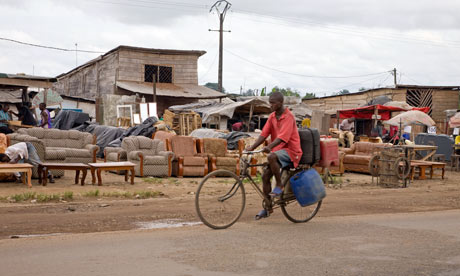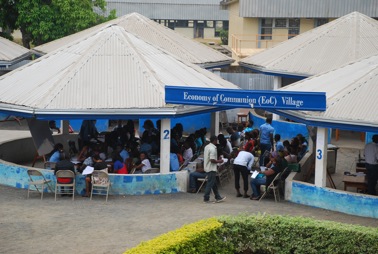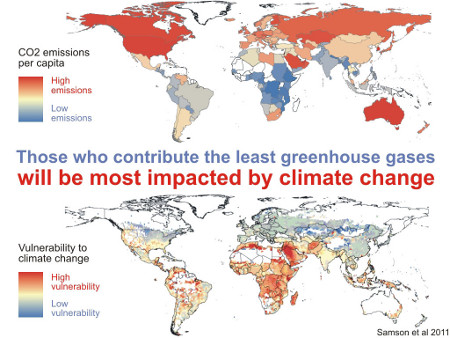by John Abraham, "Climate Consensus - The 97%," The Guardian, January 28, 2014

A man rides a bicycle in Cameroon; a country very vulnerable to climate change that it didn't cause, but developing innovative solutions to the problem. Photograph: Peter Treanor/Alamy
My research involves not only studying the Earth's climate, but also working to find clean energy solutions that will enable people and regions to have access to reliable electricity without increasing emissions of heat-trapping gases. In support of this effort, I recently traveled to Cameroon, which is on the western coast of Africa. There, in a town near the coast called Buea, I spent two weeks with my family and colleagues, working with a new university (Catholic University Institute of Buea, or CUIB for short) but more about that later.
First, readers of this column will note that I take a particular interest in the impacts of climate change that are being felt at regional or national levels. In particular, changes to weather patterns and how those changes are being driven by either natural or human causes is something I care deeply about. Fortunately, there is extensive literature available about observed changes or expected changes to climate and weather in and around Cameroon. For instance, some studies that focus on the impacts of climate change on the water cycle project that increases in rainfall and evaporation from lakes, rivers, oceans, and plants will have impacts that must be considered in future development planning.
Another study focused on the impacts that land-use changes and climate change have on Cameroon's forests; the study found future effects will be profound. Loss of forest lands will lead to loss of animal life in particular. More recent work confirms the vulnerability of Cameroon's forests to climate change. Those researchers found that while the people in Cameroon expressed a great deal of understanding and appreciation of climate change, the ability of the country to adapt to climate change was limited.
Perhaps the most detailed study regarding Cameroon's susceptibility to climate change was completed by the World Bank, which related agricultural output to climate change, in particular to changes in temperature and precipitation. The authors reported that since a large majority of the poor of Cameroon (and a significant percentage of the national GDP) work in agriculture, Cameroon as a nation is particularly sensitive to some of the changes we expect to see as the world warms.
Perhaps the most detailed study regarding Cameroon's susceptibility to climate change was completed by the World Bank, which related agricultural output to climate change, in particular to changes in temperature and precipitation. The authors reported that since a large majority of the poor of Cameroon (and a significant percentage of the national GDP) work in agriculture, Cameroon as a nation is particularly sensitive to some of the changes we expect to see as the world warms.
And all of this brings us back to the university CUIB. I traveled there to find out what people on the ground observe. I spoke with the Dean of the School of Agriculture and Natural Resources, Dr. Laetitia Ako Kima. She told me,
"Farmers in this region are dependent on rain-fed agriculture and have observed erratic rainfall patterns and intensity which adversely affect agricultural activities and their livelihoods. Effects of this include among others, difficulty in following cropping calendars due to unpredictable and unseasonably long rainy periods, decline in crop yields, high disease incidence and crop losses, increased post-harvest losses and high labour costs, coupled with increasing incidents of HIV/AIDS.These adversely affect their livelihoods, exacerbating already entrenched poverty which prevails at the grassroots level. There is therefore an urgent need for alternative coping strategies to mitigate prevailing circumstances."
 Outdoor community classrooms at CUIB.
Outdoor community classrooms at CUIB.
So, how will a country like Cameroon plan for climate change and how do universities like CUIB contribute to those plans? First, we must recognize that climate change is a global problem. Emitted greenhouse gases do not abide by borders, nor do their impacts. In fact, as we've seen elsewhere, Cameroon is another country that has largely not caused the problem but may be impacted more significantly than other nations. The reason for this is threefold. First, since Cameroon's annual temperatures are confined to a small range, the biological systems are less capable of adapting to changes that modify the range. Second, Cameroon is heavily dependent on agriculture, which, in turn, depends on climate. Finally, Cameroon's limited financial resources make adaptation particularly difficult.
 Countries that contribute least to climate change tend to be the most vulnerable to its impacts, according to Samson et al. (2011).
Countries that contribute least to climate change tend to be the most vulnerable to its impacts, according to Samson et al. (2011).
Of course, Cameroon can, and will, play their role in reducing greenhouse gas emissions. However with a high unemployment rate and with challenges related to electrical power production and distribution, what can this country realistically achieve?
This was one of the questions I asked as I sat down with the Dean of the School Engineering, Dr. Asong Zisuh and his students. I quickly learned that innovative ideas from the young and entrepreneur-minded scientists and engineers might serve as a role model for us all. Dr. Asong Zisuh told me,
"The mission of CUIB (the entrepreneurial university) is to prepare servant leaders with moral and spiritual values to contribute to the sustainable development of their communities. Students are required to undertake entrepreneurial projects on issues related to sustainable development. Ongoing student projects in the the School of Engineering include: construction of wind turbines to generate clean and renewable electricity; construction of a solar drier to help conserve local farm products; drawing building plans for local housing that incorporate energy conservation practices; developing concepts for sustainable management of solid and liquid waste by local councils; biogas production for small scale use; and production of briquettes from bio-residues."
All of these very advanced and innovative ideas have been generated by enthusiastic undergraduate students. The young, it seems, express tremendous courage because they don't know what cannot be done. By this naïveté, they are sometimes able to accomplish what we old folks think is impossible.
The motivation for these environmental-conservation and climate change projects is not only related to the need to curb greenhouse gas emissions, but also to meet the growing demand for energy amidst huge supply shortages. Cameroon is a tropical country that receives a significant amount of daily sunshine and experiences a high generation rate of bio-residues, especially from agricultural activities. Thus, harnessing these available and inexpensive opportunities is required for the sustainable and economic development of the country.
Retrospectively, for someone like myself who works everyday on climate change, the slow progress can be demoralizing at times. I know that humans have the capacity to solve our climate and energy problems, we only lack the will. When I see what is happening at a small Cameroonian university that almost no one has heard of, I get encouraged. Maybe, just maybe, innovators like I've met at CUIB will be the change agents needed to preserve our future. Let's hope that's the case and let's support their efforts.







No comments:
Post a Comment